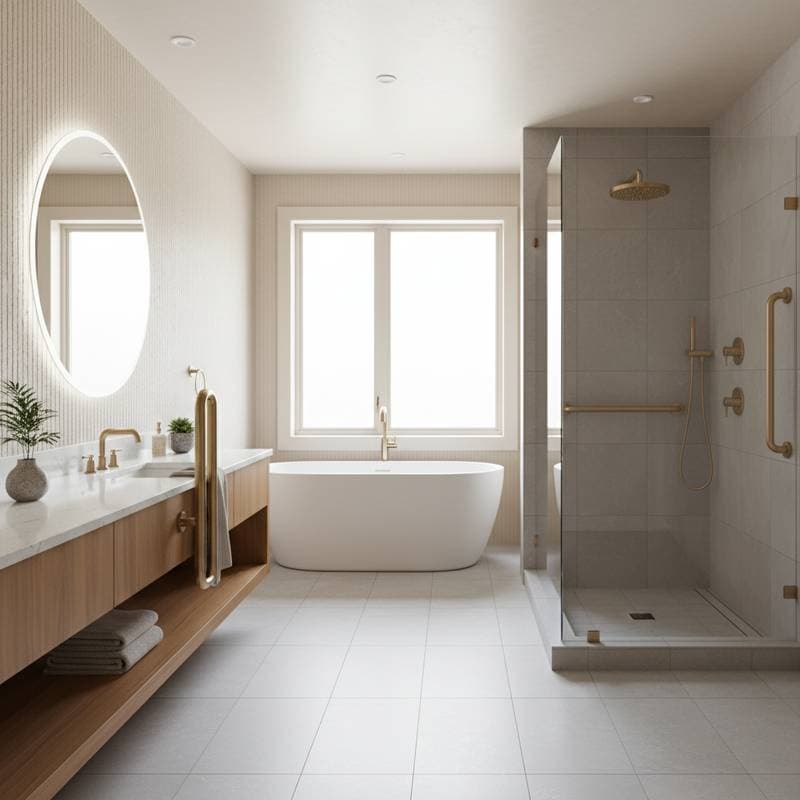Navigating Rising Bathroom Remodel Costs in 2025
Homeowners planning a bathroom renovation in 2025 face unexpected challenges. Material costs have climbed, skilled labor remains scarce, and new regulatory standards for efficiency add layers of complexity. These factors have pushed average project expenses 20% higher than in previous years, demanding more precise budgeting and informed choices.
Before selecting materials or hiring a team, gain insight into the forces shaping these changes. This knowledge equips you to maintain quality and comfort while adapting to the evolving market.
Updated Cost Ranges and Key Influences
A basic bathroom remodel, featuring standard finishes, now costs between $12,000 and $18,000, up from the prior average of $10,000. Luxury options with custom elements such as imported tile, quartz surfaces, and high-end fixtures often exceed $35,000. Labor expenses have risen 10 to 15 percent nationwide, while materials like porcelain tile and brass fittings have experienced comparable increases.
Geographic differences amplify these trends. Urban and coastal regions encounter 20 to 30 percent premiums from rigorous codes and elevated wages. In contrast, rural locations offer lower base rates, but factor in potential surcharges for material transport and contractor travel.
Factors Driving the Cost Increases
Multiple elements contribute to the current pricing dynamics:
-
Elevated Material Prices: Disruptions in global supply chains and higher production expenses have inflated costs for essentials like ceramic tiles, vanities, and pipes. Premium selections, including marble slabs and overseas ceramics, face the steepest hikes.
-
Limited Availability of Skilled Labor: Demand for certified plumbers, electricians, and finish carpenters outpaces supply, boosting rates by as much as 20 percent in competitive areas.
-
Evolving Building Codes: Requirements for low-flow toilets, energy-star bulbs, and improved exhaust systems mandate upgrades that raise initial outlays, though they yield future utility reductions.
-
Intricate Design Elements: Popular additions like seamless walk-in showers and wall-mounted sinks demand advanced techniques, extending project timelines and labor hours.
-
Higher Administrative Fees: Local governments have adjusted charges for permits, especially those involving structural or utility alterations.
Balancing DIY Efforts with Professional Expertise
Opportunities for DIY Savings
Individuals with basic handyman skills can tackle select tasks to reduce expenses:
- Applying fresh paint and updating trim details
- Mounting shelves, artwork, or lighting fixtures
- Swapping out hardware on sinks or showers where no reconfiguration occurs
- Laying resilient flooring options such as interlocking vinyl planks
Such efforts might cut costs by $1,000 to $4,000, depending on the project's scale and your proficiency.
Essential Roles for Professionals
Engage licensed specialists for high-stakes work, including:
- Relocating or installing new plumbing lines and drains
- Modifying circuits or outlets in electrical systems
- Constructing tiled enclosures with proper moisture barriers
- Obtaining approvals and passing required inspections
Substandard execution in these areas risks water damage, fire hazards, or failed compliance, leading to expensive fixes. Professionals deliver code adherence, reliable performance, and often multi-year guarantees.
Cost Variations by Region
- Northeast: Elevated wages and stringent regulations push mid-level projects to $20,000 through $35,000.
- Midwest: Rates sit about 15 percent below national norms, offset occasionally by shipping costs for specialized items.
- South: Abundant workforce options maintain affordability, with mid-range remodels at $14,000 to $22,000.
- West Coast: Emphasis on sustainable materials and upscale aesthetics elevates high-end budgets beyond $30,000.
Consult your local authority early to understand permitting timelines and any unique mandates that could influence scheduling.
Maximizing Return on Investment
Thoughtful bathroom updates recoup 55 to 65 percent of expenses upon home sale. These improvements extend beyond resale appeal; they enhance daily usability and cut operational costs through better insulation and resource management. Potential buyers prioritize fresh aesthetics, reliable utilities, and modern conveniences, making durable craftsmanship a worthwhile priority.
Swapping to water-efficient appliances and illumination sources can trim annual bills by $100 to $200. Across a decade, these efficiencies recover a substantial share of the original spend.
Strategies for Successful Execution
Rising prices need not halt your plans. Prioritize core needs, solicit bids from at least three vetted providers, and secure fixed-price agreements promptly. Select partners who outline detailed timelines, itemized invoices, and current licensing.
For constrained funds, adopt incremental stages: address foundational systems like wiring and piping initially, followed by surface-level enhancements. This method sustains progress without financial strain.
By evaluating options thoroughly, negotiating effectively, and adapting selections to current realities, you secure a refreshed bathroom that boosts livability and property worth for years ahead.



